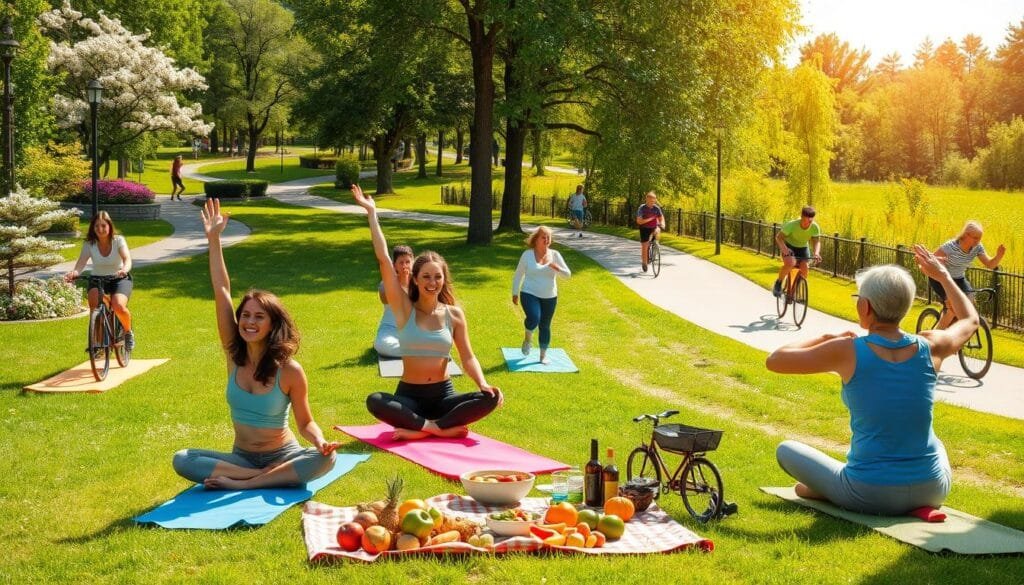Only 23% of Americans meet the recommended guidelines for physical activity. This puts most people at risk for chronic health issues. But, making lasting lifestyle changes can greatly improve your health.
These changes can boost your energy and lower the risk of serious diseases. Adopting healthy habits is a smart investment in your future.
Whether you want to lose weight, manage a chronic condition, or just feel your best, this article has you covered. We’ll look at proven strategies for a balanced lifestyle. This includes nutrition, fitness, stress management, and preventive healthcare.
Understanding how to change your behavior and overcoming obstacles is key. You’ll learn how to make lasting changes that improve your health from the inside out.
Understanding the Stages of Lifestyle Change
Changing your lifestyle is a journey, not a quick fix. It involves moving through different stages, each with its own challenges and chances. Knowing the Stages of Change helps you plan better for lasting improvements in your life.
Contemplation: Considering Change
The first stage, Contemplation, is about recognizing the need for change. People in this stage see the benefits of a healthier lifestyle but are still unsure. About 40% of people are in this stage, not yet ready to make changes.
Preparation: Making a Plan
When you reach the Preparation stage, you’re ready to make a plan. You set specific, measurable, and achievable goals. For example, losing 20 pounds in five months. Breaking down big goals into smaller ones, like losing one pound a week, keeps you motivated.
Action: Implementing Changes
The Action stage is where you start making changes. It’s the shortest stage, lasting about six months, and is the riskiest for slipping back. It’s important to track your progress and celebrate small wins, like choosing fruit over dessert.
Maintenance: Sustaining New Habits
The final stage, Maintenance, is about keeping up your new habits. This stage is about avoiding old habits and learning new ways to stay healthy. Getting psychological support, like a few sessions with a psychologist, can help.
Remember, the path to a healthier lifestyle isn’t always straight. You might go through these stages many times before you succeed. The important thing is to be patient, keep going, and celebrate your successes along the way.
Overcoming Obstacles to Healthy Living

Starting a healthier lifestyle is tough, but it’s worth it. To keep up with Healthy Habit Maintenance, you must face and beat Barriers, Lifestyle Roadblocks, and Behavior Change Challenges.
Time is a big hurdle for many. Busy lives make it hard to fit in exercise and meal planning. But, planning meals ahead can lead to better eating and less obesity.
Some think healthy food is too pricey. Yet, you can eat well without breaking the bank. Buying in bulk, picking seasonal fruits and veggies, and meal prep can save money.
- Dislike for physical activity or healthy foods: Start small and add more fun activities and healthy foods to your life.
- Weight stigma: It can make people eat more. Focus on health, not just weight, for a positive change.
- Lack of support: Having supportive friends and family helps a lot. They keep you motivated and accountable.
Beating Barriers to a healthy life is about finding what works for you. By tackling Lifestyle Roadblocks and Behavior Change Challenges, you can live a healthier life.
“Embracing discomfort as a tool for growth can lead to greater engagement and achievement in personal growth goals.”
Balanced Approach to Nutrition and Exercise
Achieving a healthy lifestyle means balancing nutrition and physical activity. Eating the right amounts of fats, proteins, and carbs is key. Experts suggest aiming for 25-35% fat, 10-35% protein, and 45-65% carbs daily.
Healthy Eating Principles
Following healthy eating principles helps you make better food choices. Use smaller plates and buy snacks in single servings. This helps control how much you eat.
Stay away from empty calorie foods like candies. Choose healthier beverages like water, low-fat milk, and unsweetened coffee or tea instead.
Incorporating Physical Activity
Physical activity is vital for your health. Adults should aim for 2 hours and 30 minutes of moderate-intensity exercise weekly. Activities like brisk walking, swimming, or cycling count.
Breaking your exercise into shorter sessions can be helpful if you’re busy. A balanced approach to nutrition and exercise brings many benefits. It improves your mood, weight, and reduces disease risk. Find what works for you and make healthy living a part of your life.
Healthy Living Ideas

Living a healthier life is easier than you think. Simple, natural remedies and wellness strategies can greatly improve your health. By avoiding charred meats, limiting sugars, and getting enough sleep, you can see big changes. These small steps can lead to significant improvements in your well-being.
One important Health Hack is to cut down on sugary drinks. They can lead to weight gain and other health problems. Instead, choose water, unsweetened tea, or infused water. Also, adding more nuts and seeds to your diet can boost your health. They are full of healthy fats, fiber, and antioxidants.
Another easy way to improve your health is to avoid ultra-processed foods. These foods are often unhealthy and low in nutrients. Focus on whole foods like fruits, vegetables, and lean proteins. Drinking coffee in moderation can also help. It can improve your brain function and lower disease risk.
| Healthy Living Tips | Impact on Wellness |
|---|---|
| Limit sugary drinks | Reduced risk of weight gain, type 2 diabetes |
| Eat more nuts and seeds | Improved nutrition, support for overall health |
| Avoid ultra-processed foods | Increased nutrient intake, reduced exposure to unhealthy additives |
| Drink coffee in moderation | Improved cognitive function, reduced disease risk |
By making small, lasting changes, you can see big improvements in your health. It’s all about finding a balance that fits your life. Remember, the goal is to make sustainable changes that enhance your well-being.
The Importance of Sleep and Hydration

Getting enough sleep quality and staying hydrated are key to a healthy life. Good sleep refreshes the body and helps control circadian rhythm and body functioning.
The human body is over 50% water, vital for body temperature and functions like sleep. Most adults need about two liters of water daily, but this can change with exercise or illness.
Research shows that short sleep duration often means not drinking enough water in adults. Caffeine and alcohol, which make you pee more, can mess with sleep if drunk before bed.
| Healthy Sleep Habits | Optimal Hydration |
|---|---|
|
|
Good sleep habits and proper hydration help improve sleep quality, circadian rhythm, and body functioning. These habits can greatly improve your health and well-being.
Mindfulness and Stress Management Techniques

In today’s fast world, stress is a big problem for many. The National Institute of Mental Health says stress is how our brain and body react to change. It can lead to high blood pressure and heart rate. But, there are ways to handle stress and feel better.
Meditation and Mindfulness
Mindfulness, like meditation, helps us deal with stress better. A study in the Journal of Research in Personality found that being present helps us cope with stress. It makes us more aware of our thoughts and feelings, helping us stay calm under pressure.
Stress-Reducing Activities
- Swimming and floating in water can release physical stress, increasing mobility and allowing more oxygen to flow into muscles.
- Meditative walking, or core walking, can help with balance and strengthen stabilizing muscles in the abdomen.
- Drinking a cup of tea mindfully can quiet the mental conversation and invite presence.
- Connecting with nature during activities like hiking can offer relaxation for the nervous system.
- Gazing meditation can aid in becoming more mindful with eyes open, enhancing the ability to transition to a balanced state of mind.
- Guided meditations like Yoga Nidra can facilitate deep internal healing and stress release while training the mind to meditate.
- Mindful stretching helps create space in the body for the breath to flow in and enhances expansion from within.
- Breathing techniques, focusing on the breath in three parts, can stimulate the parasympathetic nervous system, promoting relaxation.
Adding these activities to your daily life can help manage stress. It can also make you feel better overall.
“Stress has been associated with many health problems, such as obesity and heart disease, specially among low-income individuals.”
The Centers for Disease Control says 66% of American workers feel stressed. The 2019 Stress in America Survey shows stress is getting worse. Chronic stress can change our brain, making it bigger. Using mindfulness and relaxation can help improve our health and well-being.
Preventive Healthcare and Regular Check-ups

Good health is a lifelong journey. Preventive healthcare is key to this journey. Regular check-ups and screenings can spot issues early. This means we can act fast and manage chronic conditions well.
Preventive care includes many services. These range from routine exams and cancer screenings to vaccinations and mental health checks. These can catch high blood pressure, high blood sugar, and high cholesterol early. Early detection leads to better treatment and outcomes.
How often you need check-ups depends on your health and risk factors. Family history is important. It can tell us if we’re at risk for certain diseases. If you have a family history of diseases, you might need more frequent screenings.
Healthy habits are also vital for disease prevention. Avoid smoking, exercise, eat well, drink in moderation, and drive safely. These habits greatly improve your health and lower disease risk.
Preventive healthcare is essential for good health. Regular check-ups and following screening guidelines help detect and manage health issues early. This approach improves your quality of life and long-term health.
| Preventive Care Service | Recommended Frequency |
|---|---|
| Blood Pressure Screening | At least once every 2 years |
| Cholesterol Screening | Every 4-6 years for adults aged 20 and older |
| Diabetes Screening | Every 3 years for adults aged 45 and older |
| Colon Cancer Screening | Colonoscopy every 10 years starting at age 45 |
| Breast Cancer Screening | Mammogram every 1-2 years for women aged 40 and older |
| Cervical Cancer Screening | Pap smear every 3 years for women aged 21-65 |
Being proactive is the key to good health. Regular check-ups and healthy habits can control your well-being. Don’t wait for health problems. Prioritize preventive care for a healthier future.
“Preventive care is the foundation of a healthy life. Regular check-ups and screenings can help identify potential problems early, allowing for timely intervention and better long-term outcomes.”
Building a Support System
Creating a solid support system is key for lasting lifestyle changes. You can find an accountability partner, join a community, or get help from friends and family. Having a network of support can make a big difference.
Research shows that low social support levels are linked to health issues like heart disease and cancer. But, support systems can reduce stress and improve your physical and emotional health. They also boost life satisfaction and resilience.
Joining a support group is a great way to build a support system. These groups offer a safe space to share challenges and experiences. Professionals like therapists and Health Coaches can also provide valuable guidance.
Hobbies and shared interests can help you meet like-minded people. Enjoying activities you love can lead to meaningful connections.
Keeping communication open and honest is key to a strong support system. Regular check-ins and expressing your needs are important. Being open to others’ support helps keep your system strong.
Building a support system is a long-term investment. But, the benefits to your health and well-being are worth it.
| Importance of a Support System | Benefits |
|---|---|
| Reduced stress and physical health problems | Improved emotional well-being, life satisfaction, self-esteem, and resiliency |
| Longer lifespan and overall healthier individuals | Higher levels of happiness and positive thinking |
| Essential for sustaining lifestyle changes and achieving goals | Opportunities to give and receive support, fostering a sense of community |
“A problem shared is a problem halved.”
Building a strong support system is a valuable investment in your health and well-being. Surround yourself with accountability partners, community involvement, and a shared commitment to lifestyle changes. This will help you achieve your goals and live a healthier, happier life.
Environmental Sustainability and Healthy Living
Living sustainably can also make you healthier. By choosing eco-friendly options, you help the planet and feel better too.
Choosing products without harmful toxins is key. This can prevent health issues like allergies and cancer. Also, using green transport like walking or biking improves air quality and heart health.
Being in nature can also boost your mood. It lowers stress and anxiety. Adding natural elements to your life can improve your mental health.
When shopping, pick products with eco-labels like USDA Organic. These choices support a healthy lifestyle and the planet.
Small actions like turning off lights save energy. Choosing green transport boosts your health and reduces pollution.
“Sustainability is not just about the environment. It’s about ensuring a future where all life can thrive.” – Unknown
Every small choice you make matters. By living sustainably, you help yourself and the planet. It’s a step towards a healthier future.
| Sustainable Practice | Environmental Impact | Health Benefits |
|---|---|---|
| Reduced Plastic Waste | Decreased pollution and ocean waste | Lowered exposure to harmful chemicals |
| Organic and Local Food Choices | Reduced pesticide use and food waste | Improved nutrition and reduced risk of chronic diseases |
| Renewable Energy Sources | Reduced greenhouse gas emissions | Cleaner air and water quality |
| Sustainable Transportation | Decreased air pollution and fossil fuel consumption | Increased physical activity and cardiovascular health |
Conclusion
Making sustainable lifestyle changes is a journey with many steps. It starts with thinking about it and ends with keeping up the good work. Understanding the stages of change and overcoming hurdles is key. A balanced life, including good nutrition, exercise, and sleep, is essential for health.
Building a strong support network helps a lot. Adding environmental care to your healthy living plan makes your journey even better. This leads to a healthier, happier life.
This article has shown many holistic wellness strategies for a better life. We’ve talked about the importance of eating right and staying active. Mindfulness and managing stress are also crucial.
Remember, a healthier lifestyle fits everyone differently. It takes time, effort, and a willingness to learn. By embracing this journey, you can enjoy a healthier, more fulfilling life.
Source Links
- How to Maintain a Healthy Lifestyle: 12 Effective Tips – https://www.healthline.com/health/how-to-maintain-a-healthy-lifestyle
- Changing Your Habits for Better Health – NIDDK – https://www.niddk.nih.gov/health-information/diet-nutrition/changing-habits-better-health
- Stages of Change Model | School of Medicine – https://medicine.llu.edu/academics/resources/stages-change-model
- Making lifestyle changes that last – https://www.apa.org/topics/behavioral-health/healthy-lifestyle-changes
- Overcoming Obstacles | Lesson 3: Staying Healthy – https://www.overcomingobstacles.org/portal/en/curricula/middle-school/lesson-3-staying-healthy
- 4 Barriers to Developing Healthy Habits and How to Overcome Them – https://www.healthline.com/health/barriers-to-developing-healthy-habits-and-tips-for-overcoming-them
- Balancing food and physical activity – https://healthyliving.extension.wisc.edu/articles/balancing-food-and-physical-activity/
- Keep Active & Eat Healthy to Improve Well-being & Feel Great – NIDDK – https://www.niddk.nih.gov/health-information/weight-management/keep-active-eat-healthy-feel-great
- Healthy Lifestyles, Healthy Outlook – https://www.ucsfhealth.org/education/healthy-lifestyles-healthy-outlook
- Healthy Living: Health & Wellness Information | Merck Manual Consumer Version – https://www.merckmanuals.com/home/healthy-living
- Surprising Ways Hydration Affects Your Sleep – https://www.sleepfoundation.org/nutrition/hydration-and-sleep
- Sleep Better With Healthy Lifestyle Habits – https://www.heart.org/en/healthy-living/healthy-lifestyle/sleep/sleep-better-with-healthy-lifestyle-habits
- The Importance of Water, Sleep, and Exercise by Alyssa Roberts LVN – https://marquemedical.com/importance-of-water-sleep-exercise/
- How to Manage Stress with Mindfulness and Meditation – https://www.mindful.org/how-to-manage-stress-with-mindfulness-and-meditation/
- 8 Mindfulness Exercises That Also Reduce Stress – https://www.hawaiipacifichealth.org/healthier-hawaii/live-healthy/8-mindfulness-exercises-that-also-reduce-stress/
- Preventive health care: MedlinePlus Medical Encyclopedia – https://medlineplus.gov/ency/article/001921.htm
- Are You Up to Date on Your Preventive Care? – https://www.cdc.gov/chronic-disease/prevention/preventive-care.html
- Unlock Your Health With Preventive Care – https://kimbrough.tricare.mil/News-Gallery/Articles/Article/3796342/unlock-your-health-with-preventive-care
- How to Build a Support System For Your Mental Health | MyWellbeing – https://mywellbeing.com/therapy-101/how-to-build-a-support-system
- How to Create a Strong Support System: 10 Tips – https://www.integrativenutrition.com/blog/creating-a-strong-support-system
- Explore the Health Benefits of Sustainable Living – https://www.nih.org/nihd-news/2023/april/health-benefits-of-sustainable-living/
- 12 Ways to Live More Sustainably – https://www.biologicaldiversity.org/programs/population_and_sustainability/sustainability/live_more_sustainably.html
- Benefits of eating healthy: Heart health, better mood, and more – https://www.medicalnewstoday.com/articles/322268
- Healthy Lifestyle Essay – https://aithor.com/essay-examples/healthy-lifestyle-essay
- Essay on Healthy Lifestyle for Students and Children | 500+ Words Essay – https://www.toppr.com/guides/essays/essay-on-healthy-lifestyle/

